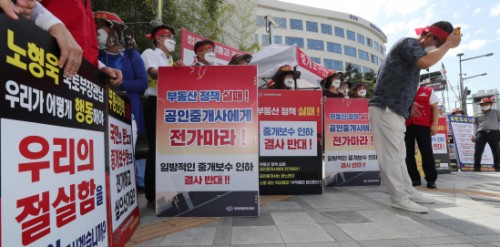 |
| A group of real estate agents from the Korea Association of Realtors rallies at the government complex in Sejong, on Aug. 17, 2021./ Source: Yonhap |
AsiaToday reporter Hwang Eui-joong
Conflicts between real estate agents and consumers over the reform of real estate brokerage fees are growing. This is because both sides are opposed to the proposal the government is pushing and trying to finalize within this month. Industry observers criticize that the government is shifting the burden of consumers on the spike in property prices to real estate agents, instead of providing reductions in property transfer tax, ahead of next year’s presidential election.
The Ministry of Land, Infrastructure and Transport held a public hearing Tuesday to discuss how to improve brokerage commissions on property purchases and rents, according to the government on Wednesday.
The ministry proposed three options on how to change the commission rates, and the second option is likely to be adopted. Under the second option, commissions for property purchase transactions under 600 million won remain unchanged. The key is cutting commissions for transactions above 900 million won by nearly half. Currently, the upper rate limit of 0.8 percent is applied uniformly to the house prices above 600 million won, but under the second option, it is significantly lowered up to 0.3 percent.
The Korea Association of Realtors (KAR) strongly opposed the government’s pressure on high-price commissions. KAR Chairman Park Yong-hyun declared to launch an indefinite hunger strike in front of the government complex in Sejong. “The recent surge in brokerage fee is mainly caused by increased number of high-priced housing,” an official from the association said. “Although the industry understands the need to cut high-priced property brokerage fees, it is difficult to accept the government’s dramatic fee cuts.”
Consumers are also dissatisfied with the proposal. The transaction fee for houses that cost under 600 million won remains unchanged, so the financial burden will not be reduced when dealing with low-priced properties for ordinary people. Consumers claim that commissions should be lowered than now. Some even argue that it should be at flat-rate at a lower price.
The intensifying conflict comes amid the spike in property prices. The Moon Jae-in administration introduced a series of real estate policies to curb soaring real estate prices, but all failed to do so. Housing prices in Seoul and its surrounding areas increased 1.17 percent last month, marking the highest rate in 13 years since 2008, according to the monthly statistics released by the Korea Real Estate Board.
This is why many critics say that the government is hiding its policy failures and handing over consumer complaints to real estate agents. The government can ease the burden of transactions on consumers with only a temporary reduction in transfer tax. Moreover, the government’s tax income has jumped this year thanks to the sharp increase in house prices. According to the Ministry of Economy and Finance, he transfer tax collected in the first half of this year amounted to 18.3 trillion won, a 64.9 percent increase from a year earlier. Most of the transfer tax income comes from real estate transactions.
“The brokerage fee controversy itself is caused by the government, which raised house prices. They have come up with an easy solution, but both real estate agents and consumers are displeased,” said Shim Kyo-un, professor in real estate studies at Konkuk University.
#real estate brokerage fee #commission #transfer tax
Copyright by Asiatoday
Most Read
-
1
-
2
-
3
-
4
-
5
-
6
-
7





















